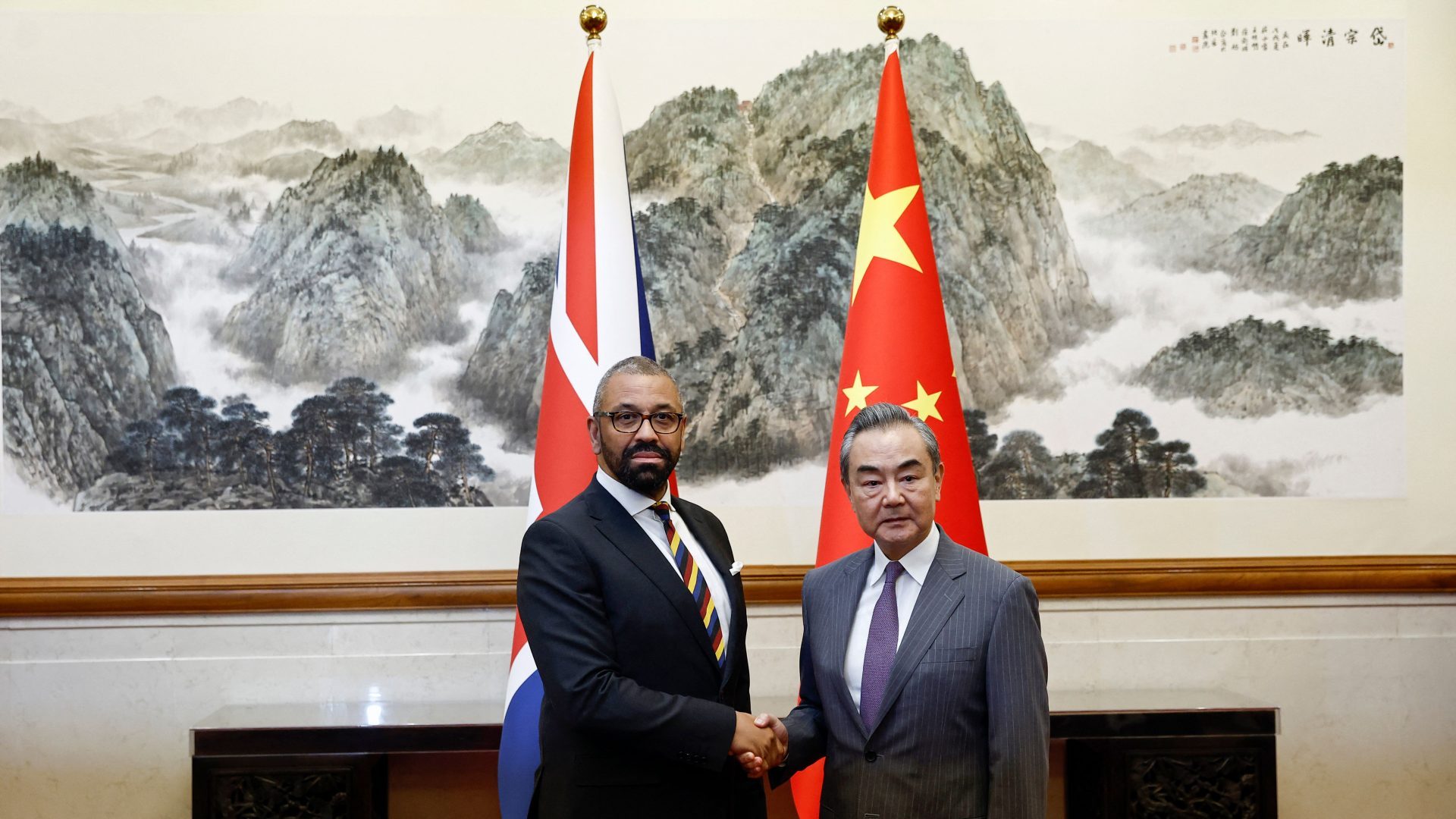There’s a scene from the movie Never Back Down (2008), where a practitioner of capoeira, the Brazilian martial art, starts a fight with a flamboyant medley of handstands, somersaults and kicks only to be floored by a single punch from a tough schoolkid from Iowa. It’s such a telling commentary on hubris that it’s become an internet meme.
I thought about that scene as I watched James Cleverly’s trip to Beijing. It was preceded by three years of verbal somersaults and handstands from various Tory leaders: China is a “threat”, declaims Liz Truss. China is a “long-term threat to Britain’s national security”, says Rishi Sunak. We’re making an “Indo-Pacific Tilt”, says the Ministry of Defence, brandishing aircraft carriers much as the capoeira guy brandishes his own ponytail in the movie.
Shortly after his arrival in Beijing, it all ended the same way for Cleverly. Gone was the word “threat”. Back was the old, familiar pandering to dictatorships under the Conservatives: we despise your values, but please invest in us and give us money.
“Attempts to distil the UK’s relationship with China down to a single word, or a soundbite, are fundamentally flawed,” said the foreign secretary. Our relationship with China, he said, will be “complicated and sophisticated”. And splat went the credibility of the British government’s strategy towards China.
In the same week, a Financial Times investigation revealed what happens when the government can neither think nor talk straight about its relationship with the emerging Chinese superpower. Unknown to the public, the investment bank Goldman Sachs helped China’s sovereign wealth fund buy numerous companies whose data would be useful to Chinese intelligence.
Using Goldman as its partner, the China Investment Corporation bought a stake in British Company LRQA, which certifies and registers shipping. One of its subsidiaries is a government contractor specialising in “ethical hacking” of defence organisations. It also bought stakes in US companies specialising in machine learning, drug testing, drones and global supply chains.
Though the Tories introduced a law to prevent security-focused companies being acquired by China in 2021, and have used it to prevent China getting a stake in a Newport-based semiconductor fabricator, there are still clearly loopholes.
So why, having cranked up the rhetoric about “threats” and sent an aircraft carrier to the Pacific, has the Conservative government suddenly gone mealy-mouthed about its strategic relationship with China?
In the first place, the incoherence of its entire post-Brexit global outlook is to blame. Boris Johnson’s infamous Greenwich speech, in February 2020, spelled out his ambition for Britain to be the battering ram for free trade against all kinds of protectionism. “Global Britain” would trade with everybody – because it had just sliced off the possibility of trading freely with Europe. That was the plan.
Then came the Integrated Review in 2021, which designated China a “systemic competitor” and pledged to refocus Britain’s security, intelligence and diplomatic resources towards the Indo-Pacific – so that Britain could play an independent role in the security of a region on the other side of the globe. No one thought to explain how these two philosophically contrary meanings to “Global Britain” made sense.
Then came the Russian attack on Ukraine, and China’s tacit support for it. And once that failed, western capitals – led by Washington – have been working overtime to dissuade China from rearming Russia in real-time. And if that means dropping the word “threat” – used both by Sunak and Truss as prime ministers – then so be it. Never mind the six Tory MPs who’ve been personally sanctioned by Beijing over their criticism of Chinese human rights abuses in Xinjiang. Indeed, never mind Xinjiang. And never mind the Hong Kong students and trade unionists who are languishing in jail because China unilaterally ripped up its agreement with Britain over the governance of the territory. As for the Chinese diplomats who dragged a protester inside the Manchester consulate and beat him up. That’s been dealt with, well, diplomatically.
I have no objection to Britain practising realpolitik to dissuade China from supporting Russia. But in the long term, “de-risking” our relationship – ie reducing our reliance on Chinese technology and raw materials – has to, if things get worse, evolve into “decoupling” our economies altogether.
China, to put it bluntly, sees everything as a tool for the advancement of its own security and economic interests. Soft power, hard power, commerce, trade, gullible western investment banks and ex-RAF pilots willing to train their Chinese counterparts for cash. There is no division between public and private sectors when it comes to security for the PRC: the state claims the right to access the intellectual property of any company involved in computing, defence or AI, and rigorously utilises trade to create dependencies among its adversaries.
We need to get real. China is not a capitalist country whose rulers are just playing at communism. It is a country whose ruling philosophy justifies cancelling the human rights of 1.7 billion people, and the export of its totalitarian outlook in order to reach its development goals. It is a dictatorship and, unlike Russia, a successful one – and will use the recently expanded BRICS alliance to create a bloc of like-minded autocracies.
Our only counterweight to this new reality is an alliance of democracies prepared to speak the truth about China, and to the Chinese elite, even as we manoeuvre to limit the damage Russia has inflicted on the global system.




